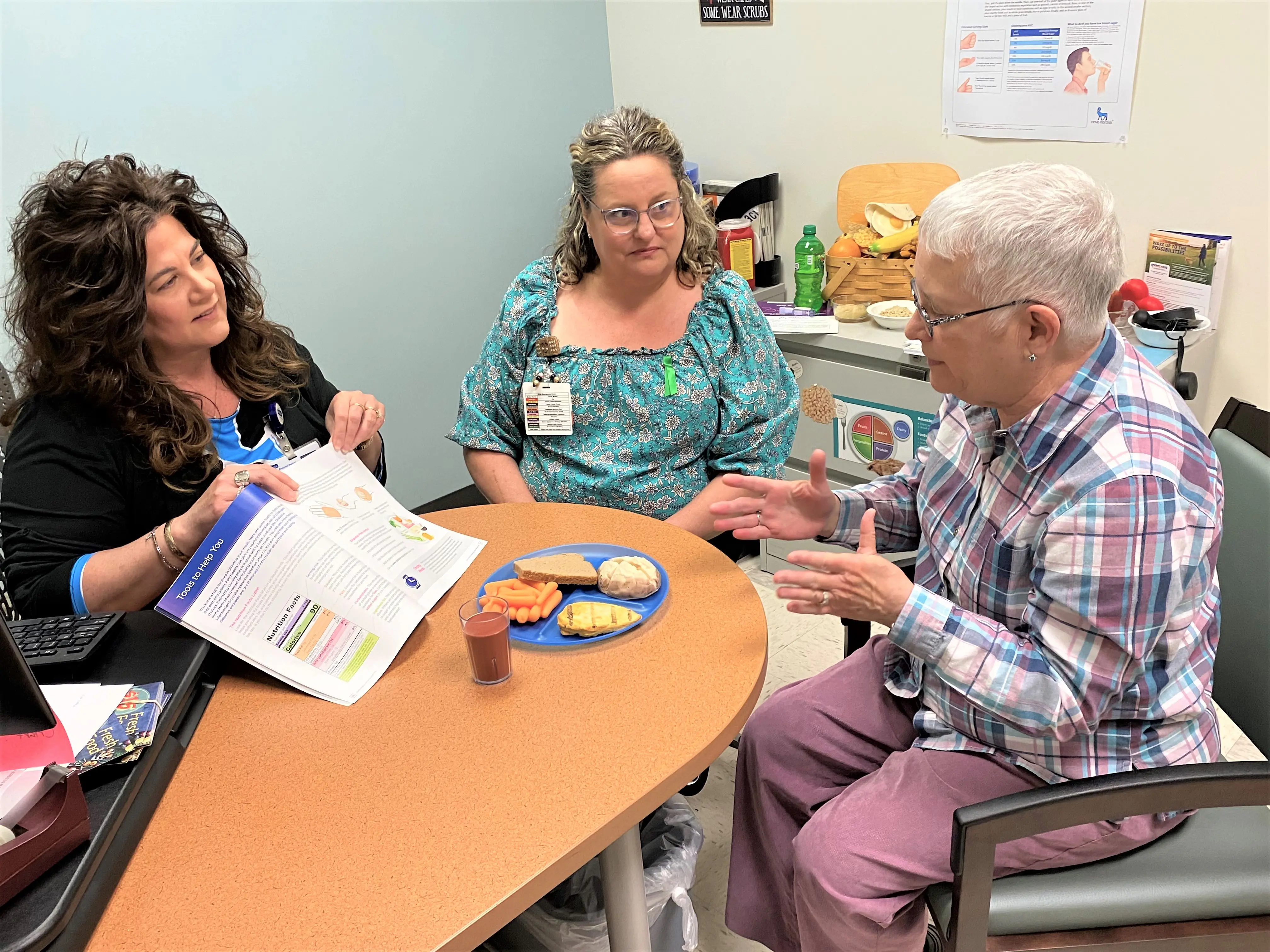Diabetes Educators Help Patients Lead Their Best Lives

Jackson resident Caryn Lawler didn’t want to acknowledge she had diabetes, especially with a family history that saw her diabetic father and grandfather suffer fatal strokes after a significant time living with the condition.
Once she came to grips with her own diagnosis, however, she found what she needed to better deal with it in Amy Montgomery and Christina Bernard, two of Adena’s certified diabetes care and education specialists. Her primary care provider, nurse practitioner Jennifer Duncan, suggested the health system's diabetes education program would be right for her.
“These people listen,” Caryn said. “They are practical about what’s achievable and accessible. They also are strategic. Every time I’ve come in, they’ve been able to make pointed suggestions in areas where I need help, like finding the right socks or finding ways to deal with stress levels or what I should do when my blood sugar was too high or low and being very specific on the strategies for problem solving.”
It’s that kind of attention that recently earned Adena’s diabetes education program a renewal of its accreditation from the Association for Diabetes Care and Education Specialists (ADCES). The latest accreditation, which has to be renewed every four years, continues a run of accreditation going back at least two decades.
“The biggest thing about accreditation, and I’m always going to lean toward the patient experience, is that it makes what you are doing more valid for patients,” Amy said. “It speaks to the fact you meet certain standards of care and the education is quality education following a standardized curriculum.”
Accreditation also provides access to a variety of resources, the latest news in the field, and patient resource materials from ADCES that are valuable in the education process.
In order to achieve accreditation, a program must meet a significant set of criteria. That includes such things as ensuring all educators have received a certain amount of continuing education; looking at how well the program is serving the population and helping overcome barriers patients may have; and reviewing patient numbers, curriculum samples, and patient chart samples.
Amy and Christina see patients in the Health and Wellness building on the Adena Regional Medical Center campus while the program’s third certified diabetes care and education specialist, Beverly Hughes, works in Washington Court House. They handle on average about 120 appointments a month, many lasting about an hour to help maximize the educational value for patients.
Addressing a patient’s mindset is the starting point on the road to success.
“A lot of people, I think, first come in feeling kind of defeated and down about their diagnosis like there’s no hope,” Amy said. “I think a lot of times when they talk to us, we instill some confidence in them and they realize they can reach their goals and have success.”
After that, it’s about providing patients the education they need to manage their condition and having the flexibility to find solutions to issues that both educator and patient can agree on so the patient can live his or her best life. Some patients, for instance, may not want to give up a particular food or drink that would improve their condition, so the educators can work with them to find a suitable alternative that would have a similar positive impact for them.
Caryn acknowledged that there were things she didn’t want to do and was very appreciative of the patience and flexibility the two educators demonstrated with her.
“The education made me pay attention, and I wasn’t used to that,” she said. “I was used to doing whatever I wanted, however I wanted, whenever I wanted.”
The true benefit of the program for her, however, she sums up in a single number – 6.1. That is her most recent A1C level, a measurement of what her sugar consumption has been and a measurement that can be impacted by such things as stress and medications. The number is down from 8.7 after just three months in the program.
Because about 90% of the success of the program is based on teaching patients proper self-care, the curriculum focuses on self-care behaviors such as healthy eating, exercise, monitoring, medications, problem solving, healthy coping, and reducing risks. Success also does not rest on the educators alone, they communicate regularly with a patient’s primary care provider with updates on patient progress and with suggestions of steps the patient may benefit from taking.
Sometime in the near future, the educators said they are looking at a return to group classes that were interrupted by the COVID-19 pandemic. And while they feel the educational sessions are most effective when conducted in person, they said it appears telehealth options will continue to be reimbursable for diabetes education despite the end of the federally declared public health emergency.
Ultimately, the goal is to show patients that successfully managing their diabetes is possible.
“You often hear about all the awful things about diabetes and don’t often enough hear someone with diabetes saying their life is full, they have a successful career, they’ve raised their children and lived their life,” Amy said. “There are, though, a lot of people out there who live with diabetes and live with no complications. Not that it’s easy, but it can be done.”
The re-accredited diabetes education program at Adena has proven its ability to show patients how.
For more information on Adena’s diabetes education and counseling services, call 740-542-3663.